Kitamoto Nature Observation Park 北本自然観察公園
|
|
|
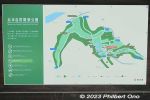
Kitamoto Nature Observation Park is spread over 26.7 hectares and home to a variety of plants and animals, including over 1,700 species of insects and 160 species of wild birds. Lots of marshland where birds can nest. Walking paths are provided for visitors. The park includes a nature study center, a library, and guided tours on weekends.
|
|
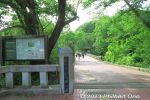
Park entrance. The park is open to the public from 9:00 am to 5:00 pm (until 7:30 pm on weekends and mid-summer.) Closed Mon. unless it's a national holiday. Free admission. Parking available. 15 min. by bus from JR Kitamoto Station (JR Takasaki LineAddress: 5-200 Arai, Kitamoto, Saitama
埼玉県北本市荒井5-200
埼玉県自然学習センター
|
|
|
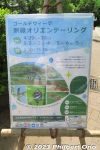
Free guided tours cover only a small part of the park. If you want to explore the entire park, go on your own. The park opened in July 1992 by Saitama Prefecture.
|
|
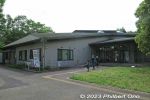
Saitama Nature Study Center is a visitor's center with park staff, park maps, a small library, nature exhibits, meeting rooms, and park offices. Open 9:00 a.m. -5:00 p.m. (Till 7:30 pm on weekends and national holidays.) Guided tours start inside.
|
|
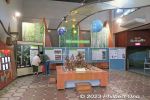
Inside Saitama Nature Study Center with nature exhibits.
|
|
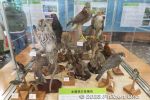
Stuffed wild animals in Saitama Nature Study Center.
|
|
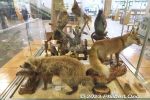
Raccoon, fox, and weasel.
|
|
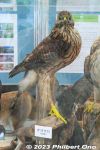
Northern goshawk, juvenile.
|
|
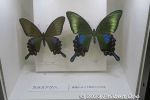
Chinese peacock butterfly. カラスアゲハ
|
|
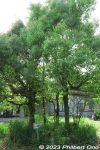
In front of the Saitama Nature Study Center is china root or Smilax china. サルトリイバラ
|
|
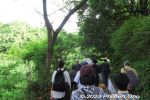
Guided tour of the park. About an hour long.
|
|
|
|
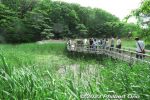
Boardwalk across the marsh.
|
|
|
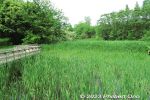
Boardwalk and reeds where birds and fish can live.
|
|
|
|
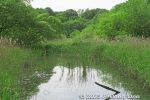
Marshland and reeds provide habitats for nesting birds. We saw Little Grebes nesting here.
|
|
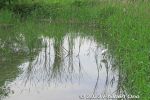
Heron.
|
|
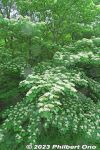
Giant dogwood is a tall flowering plant. ミズキ
|
|
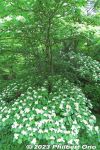
Giant dogwood is nicknamed "Wedding Cake Tree" due to the multi-tiered trunk and branches. ミズキ(Mizuki)
|
|
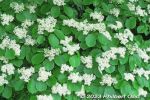
Not allowed to pick any plants.
|
|
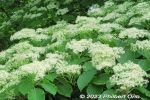
Giant dogwood flowers. ミズキ(Mizuki)
|
|
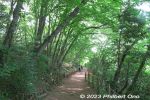
Nature trail.
|
|
|
|
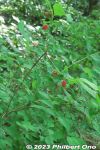
Small edible fruit of this flowering plant. Lonicera gracilipes Miq. var. gracilipes ヤマウグイスカグラ(山鶯神楽)
|
|
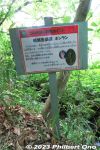
Endangered flower species named golden orchid. Vulnerable (VU). キンラン(金蘭)
|
|
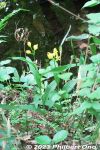
Endangered flower species named golden orchid. Status is "Vulnerable (VU)." キンラン(金蘭)
|
|
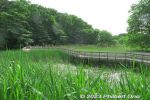
Nice boardwalk across the marsh where we could see and observe birds and water plants. Our guide brought a binoculars which we used to spot bird nests.
|
|
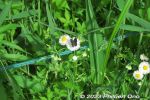
Dainty flower.
|
|
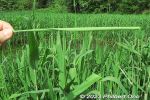
Our guide showed us how to create a wind instrument using wild leaves like this. Roll it up into a cylinder and blow.
|
|
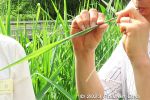
Making sounds with a leaf. Loud, piercing sound.
|
|

Mini strawberries. Hardly any flavor.
|
|
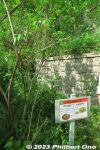
Mulberry tree whose bark is used to make washi paper.
|
|
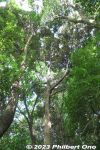
Evergreen tree named Castanopsis. Leaves are green on the top, but brown on the underside. Produces acorns. スダジイ(すだ椎 Castanopsis sieboldii subsp. sieboldii)
|
|
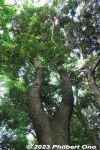
Evergreen tree named Castanopsis. Leaves are green on the top, but brown on the underside. Produces acorns. スダジイ(すだ椎 Castanopsis sieboldii subsp. sieboldii)
|
|
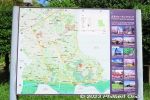
Kitamoto has other walking trails. Looks pretty during cherry blossom season.
|
|
|
|
|
|
|